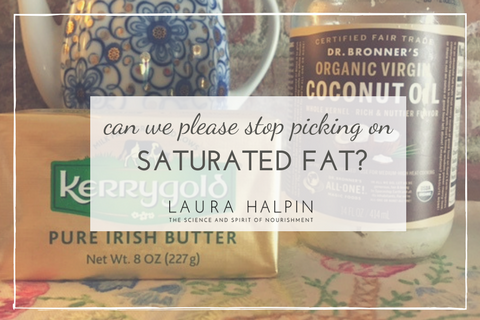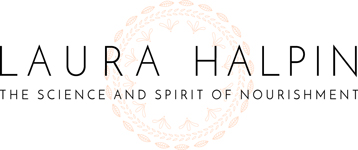
Can we please stop picking on saturated fat?
I've been happily traveling with my family for the past couple of weeks. In my absence, the American Heart Association issued a doozy of a report entitled "Dietary Fats and Cardiovascular Disease: A Presidential Advisory from the American Heart Association." Part of the report included information about coconut oil, and perhaps due to coconut oil's current popularity, the press focused mainly on it. One article appeared in USA Today: "Coconut Oil Isn't Healthy. It's Never Been Healthy."
Do we really have to keep revisiting the issue of saturated fats, cholesterol and heart disease? Please excuse me while I bang my head against the wall.
Understandably, I'm getting questions from my coconut oil eating clients. In the jet-laggy early morning hours, I've read over 75 pages of articles written in response to the AHA report.
For those of you who are interested in doing some in-depth reading about the AHA, the science of fats, cholesterol and cardiovascular disease, there are links at the bottom of this post to various articles I recommend.
For right now, I'd just like to summarize a bit of what I know about the world of fats and why I knew immediately that the AHA is getting it wrong (still and again).
Fat does not make us fat and other widely accepted falsehoods
Fat is a demonized and poorly understood macronutrient.
The demonization of saturated fat began with the cherry-picked research of University of Minnesota physiologist Ancel Keys. Keys recommended a low-fat, low-cholesterol diet that became part of public discourse when Keys made the cover of Time in 1961. He had generated the diet-heart hypothesis earlier in the 1950s. This hypothesis stated that saturated fat raises cholesterol, and cholesterol increases incidences of heart disease. This was the genesis of the "War on Saturated Fats." The short story: although Keys had data on diet and heart disease from 22 countries, he chose only seven countries' data to use as evidence. Had he used data from all 22 countries, the link between heart disease and fat intake would have disappeared.
It took some doing on Keys' part, but ultimately the American Heart Association issued a report (in 1960) strongly suggesting Americans could reduce their risk of heart disease by reducing overall fat in their diets and by replacing saturated fats with polyunsaturated fats. In the next two decades, although the American Medical Association vehemently disagreed with the recommendations, the US Government would institutionalize them, beginning with George McGovern's first Dietary Goals for the United States in 1977. This story is chronicled in fascinating detail in Gary Taubes' books Good Calories, Bad Calories and Why We Get Fat. (At the end of this post is a rebuttal to the current AHA report written by Taubes I think you'll find compelling.)
Do you remember learning about the food pyramid when you were in elementary school? Well, the food pyramid grew out of Keys' work. As a result, many of us grew up knowing for sure that we just needed an eensy teensy bit of fat (and in the form of heart-healthy margarine, right?) and liberal amounts of bread, pasta, grains and other carbohydrates.
Oy vey.
The United States has not gotten healthier or thinner on this diet. The food industry (which along with Big Pharma helps to fund the American Heart Association) got richer on using cheap refined oils that were supposedly heart healthy. Wesson oil, corn oil, canola oil, soybean oil...all cheap, all damaged goods and all inflammatory.
Why fat doesn't make us fat
Fat has more calories per gram than protein and carbohydrates. True. When we look at our food simply through the lens of calories, we overlook much more valuable information about what a particular food is doing in and for our bodies.
One important thing to know about fat is that we digest it more slowly than protein and carbohydrates. A meal with fat in it stays with us for longer. It's satiating. Compare a breakfast of eggs, avocado and salsa to a bowl of cereal with non-fat milk. The first is a balance of protein, fat and carbs, the second one is much higher in carbohydrate. One meal is going to keep us satiated for longer, and this results in more even moods, energy and cognitive ability. A meal that has a higher percentage of fat also results in less glucose and insulin in our blood stream.
Stabilizing our blood sugar (by reducing carbs and increasing fats) is one of the most pressing and easy efforts we can make to ease wear and tear on our bodies. For one, erratic blood sugar is a significant contributor to weight gain, especially weight gain around the midsection. Blood sugar imbalances are also a major factor in heart and brain disease. You may have heard Alzheimer's nickname: "Type 3 Diabetes." Blood sugar dysregulation is also a significant factor in adrenal health, thyroid health, and emotional stability (depression and anxiety). Mark Hyman, chairman of the Institute of Functional Medicine, in his book The Ultra Mind Solution, writes, "By far, the most important factor in brain aging and inflammation in America is sugar." It's not the fat.
But it is about quality.
Every cell and nerve fiber in our body is surrounded by a layer of lipids (fats). Our brain is made up of 60% fat. The most important raw material of our steroid hormones is cholesterol. The quality of the fat we ingest in our diets help determine the health and qualities of our cell membranes, nerve and brain health. This concept was made beautifully clear to me when I read the book The NDD Book by Dr. William Sears. ("NDD" stands for "Nutrient Deficit Disorder.")
You hear the phrase "quality fats" bandied about. What does that mean? How do we know if a fat is "quality" or not? Three main factors:
- Stability
- Processing
- Effect on inflammation
Let's talk about stability.
A fat becomes damaged when it is oxidized, or damaged due to heat, light or oxygen. If we ingest oxidized fat, it promotes oxidation or free-radical damage in our bodies. I'll say it again: damaged or oxidized fat causes cellular damage in our bodies. Free radicals in the body lead to inflammation.
The less stable a fat is, the more likely it will be oxidized. A saturated fat is made up of a straight chain of carbons with single chemical bonds. These single bonds are strong. This strong chain of carbons is saturated with hydrogen, which creates chemical stability.
The more unsaturated a fat is (the more double, weaker bonds between carbons where hydrogen cannot "attach,") the more reactive it is to heat, light and oxygen. Mono-unsaturated fats, like olive oil and avocado oil, are healthy oils, but they are more susceptible to damage than saturated fats. This is why we know we can leave a stick of butter out on the counter without it going "off," where we know that olive oil needs to be in a dark bottle with the lid on tightly. Make sense?
So then let's turn back to the "heart healthy" Wesson oil commercials which featured poly-unsaturated oils. Poly-unsaturated fats, dominant in vegetable oils like canola, soybean, and safflower oils have two double (weak) bonds between carbons in a carbon chain. They are missing more hydrogen and are thus very unstable, rendering the fat highly reactive to light, heat, and oxygen. Polyunsaturated fats generate unwanted free radicals that wreak havoc in your body.
Dear Florence had it all wrong.

Processing
So again: saturated means stable, and thus less likely to be damaged by heat, light or air.
Polyunsaturated vegetable oils, which are more susceptible to damage from the get-go, also require processing with pressure, heat, and chemical solvents. This makes sense: It takes a lot more effort to get fat out of corn than it does to get it out of milk. This processing renders the fragile oils oxidized. Cook with them at high heat (which causes more oxidation) and you've got yourself an inflammatory, free-radical situation.
Poly-unsaturated oils: Anti-inflammatory or inflammatory?
OK. So we've got our 3 main categories of fatty acids: saturated, mono-unsaturated and poly-unsaturated.
Let's look at polyunsaturated fats more closely.
You've heard of Omega 3 fatty acids and Omega 6 fatty acids, right? They are essential fatty acids, meaning we have to get them from our food. Omega 3s and Omega 6s fall under the category of polyunsaturated fats.
Omega 3s are generally anti-inflammatory. Omega 6s are generally pro-inflammatory fatty acids. In order for our immune system to properly function, we need it to turn ON inflammation to do its work of fighting infection and cellular damage. We also need our immune system to turn OFF inflammation when its work is done. Omega 6s help turn on inflammation; omega 3s help turn it off.
In the United States animals are fed Omega 6 rich corn and soy rather than Omega 3 rich grass. Combined with use of supposedly "heart healthy" polyunsaturated oils like canola and soy, we have way more Omega 6s in our diet than Omega 3s. This means we end up inflamed.
Inflammation creates an environment in the body where chronic disease happens: heart disease, depression, cancer, arthritis, auto-immune disorders. So, how can Omega 6 rich oils be heart healthy? Just doesn't make sense.
If you've ever bought flax seed oil, you typically buy it in a small dark bottle that is refrigerated, right? We'd never cook with it either. That's because flax seed oil is rich in Omega 3s, and being polyunsaturated, needs to be treated as such. Same with our omega 3 rich fish oils.
Knowing that these polyunsaturated fats are so fragile, you'd think that our corn and canola oil would be in dark bottles and in the refrigerated section, right? Hmm...
So, there are a number of problems here with our canola oil:
- It's fragile, and so we don't want to be cooking with it;
- It's fragile, and so by virtue of the processing involved to get oil out of the seed, it's oxidized;
- It's high in omega 6s, and so it's inflammatory.
Other oils that fall into this same category? The oils you see in your bottled salad dressings and the oils used up and down the snack aisle in the grocery store. Safflower, soy, canola, vegetable oil.
I've oversimplified all of this. The oils we use and foods with fat in them have a fatty acid profile, meaning they're made up of a combination of saturated, monounsaturated and polyunsaturated fat. For example, olive oil, which is a predominately monounsaturated fat, is made up of approximately 20% saturated fat. Also, you may have heard that canola oil has some omega 3 fatty acids in it. This is true. Yet by virtue of canola's processing, whatever omega 3s in it are oxidized by the time we open up the bottle.
Dear Saturated Fat: Can we be friends?
Coconut oil and other saturated fats are nourishing and health protective.
Research supports the use of coconut oil for obesity, insulin resistance, hypertension and Alzheimer's. Coconut oil has anti-microbial, anti-bacterial and anti-viral properties.
Butyric acid, a fatty acid found in butter, ghee and parmesan cheese, supports the health of the small and large intestine, is anti-inflammatory, and is being studied for its possible use for diabetes.
There is a lot more to say on the matter, but this post is getting too long.
Take-aways
- Eat saturated fats in peace. This includes yolks too! Do not be swayed by saturated fat fear mongering. It's based on old, flawed science. We need to put this topic to rest.
- Get rid of inflammatory poly-unsaturated fats in your kitchen. Toss your canola, safflower, soy, Wesson oil, etc. Read labels on any packaged food for these fats.
- In terms of cooking fats, consider what's been used for hundreds of years: butter, ghee, coconut oil, olive oil, even lard.
- Avoid products like Earth Balance and other butter substitutes. Read those labels!
Again, if you'd like to do additional reading with cited studies, please read some or all of the articles included below.
Additional reading:
All of these are linked to articles on the topic. Read away! Get educated so you're not at the whim of inaccurate headlines.
USA TODAY article: Coconut Oil isn't Healthy. It's never been Healthy.
Gary Taubes article in response. Such a goody!
The following article is by Chris Kresser. Kresser is one of the best examiners of research I know. He is my first go-to.
Dr. Mark Hyman, chairman of Institute of Functional Medicine, is another reliable, reasonable voice in health care. In the article below, he writes about many aspects of fat facts. He goes on to correct some of the information he gets wrong in an earlier book, also discussing Dr. Dean Ornish's research. Thorough and a great read.
http://www.greenmedinfo.com/blog/defense-coconut-oil-rebuttal-usa-today
Why Coconut Oil Won’t Kill You, But Listening to the American Heart Association Might!
Chris Masterjohn is the expert in the research of fat and cholesterol research. Even just to dabble in this article is a good step. Pretty heady stuff.
Is Coconut Oil bad for my heart!? (Re: That USA Today Coconut Oil Article)



